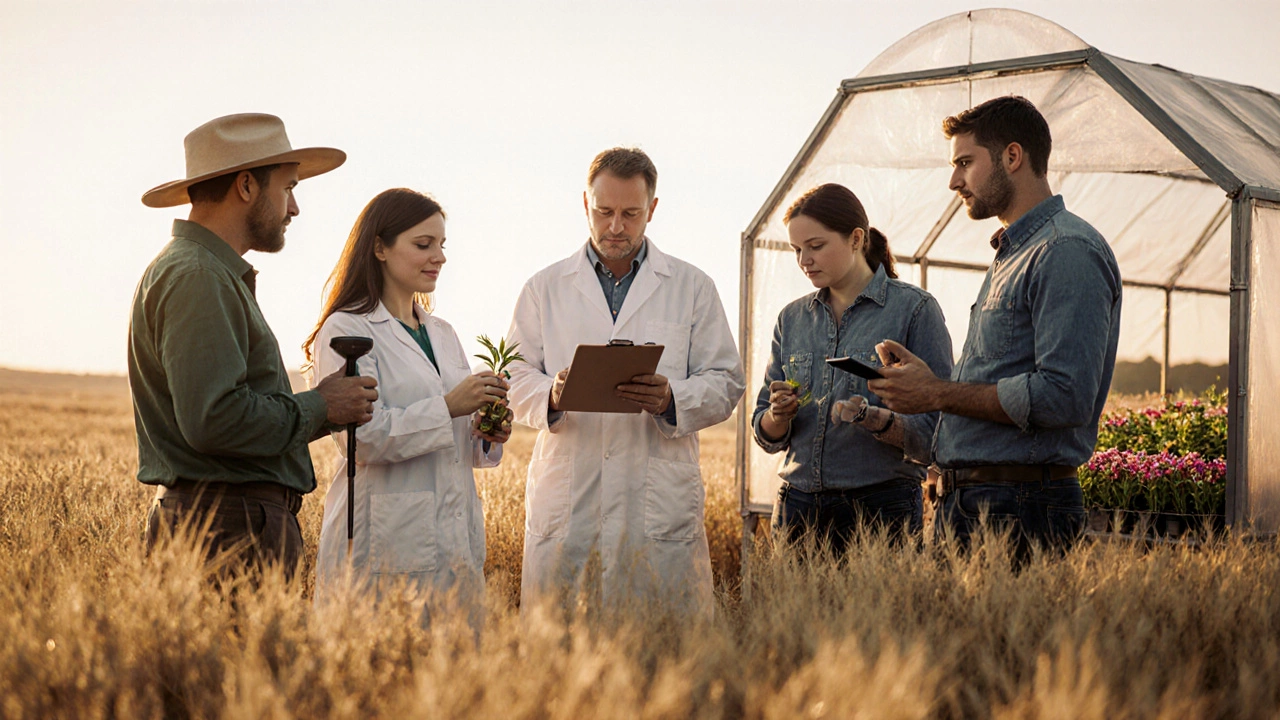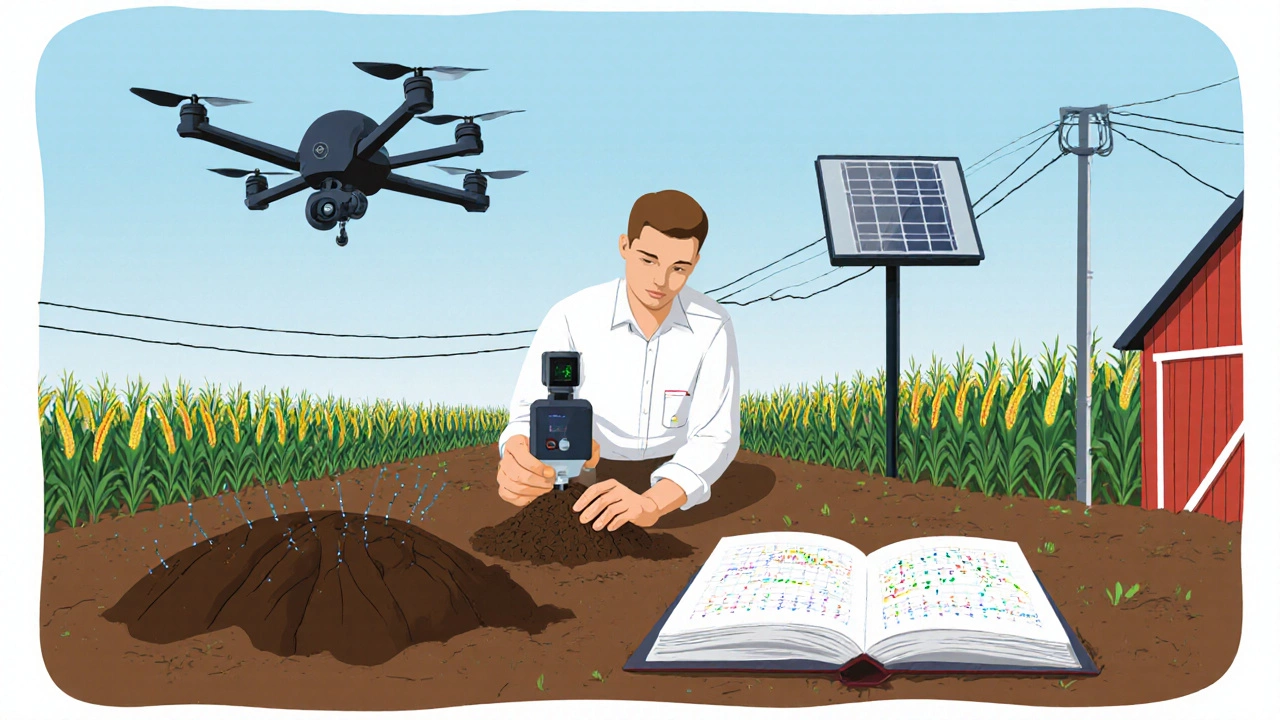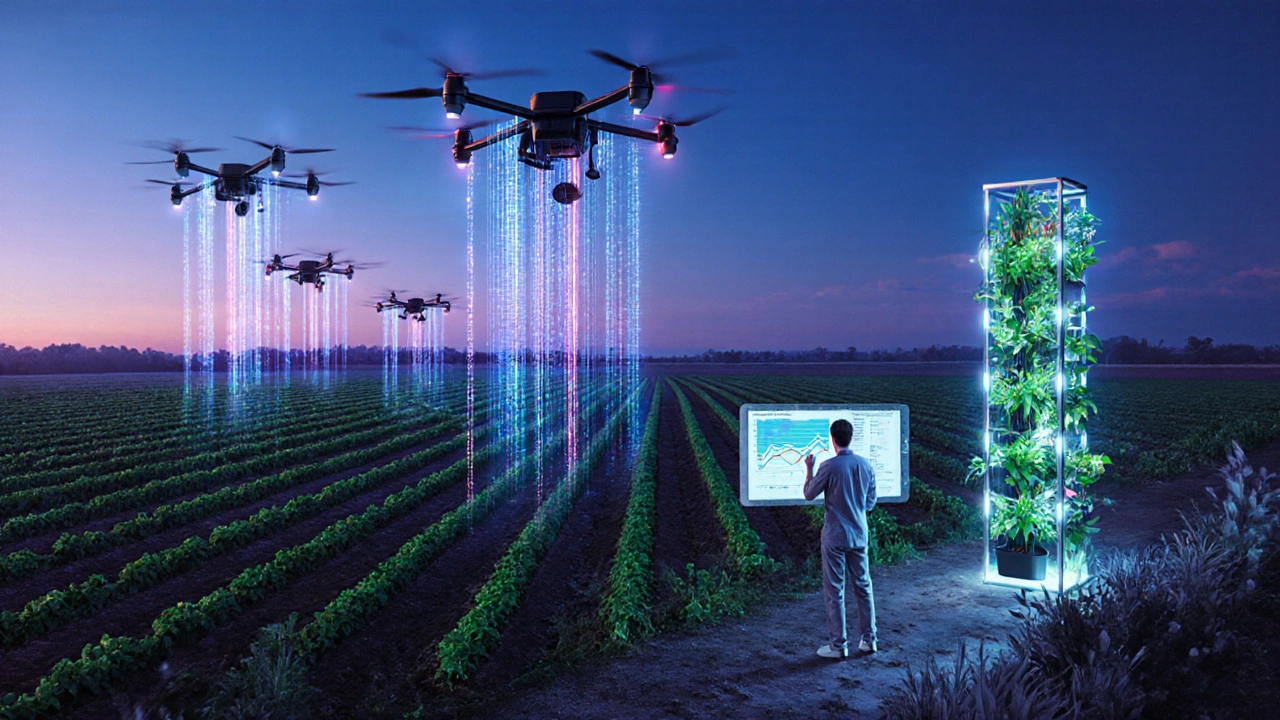What Is an Agriculture Expert Called? Titles, Roles, and Career Paths
 Oct, 26 2025
Oct, 26 2025
Agriculture Career Path Finder
Find Your Agriculture Expert Role
Answer these 3 questions to discover which agriculture career path matches your interests and strengths.
Ever wondered what you should call someone who knows everything about crops, soil, and farm management? In the world of farming and food production, there’s a whole roster of titles - from the classic agriculture expert to more specialized names. Knowing the exact term helps you understand their training, daily duties, and where they fit in the food system.
Defining the Core Titles
Agronomist is a science‑based professional who applies plant and soil science to improve crop yields and sustainability. Historically, agronomists emerged in the 19th century as the scientific backbone of the agricultural revolution, translating lab findings into field practices.
Agricultural Scientist is a researcher who investigates broader aspects of agriculture, including genetics, ecology, economics, and policy. They often work in universities or government labs, pushing the boundaries of what we can grow and how we grow it.
Both titles sit under the umbrella of “agriculture expert,” but each carries a distinct focus and career trail.
How Their Education Paths Differ
Understanding the schooling behind each role clarifies why they’re called different things.
- Agronomist: Typically holds a BSc in Agronomy, Crop Science, or Soil Science. Many pursue an MSc or PhD for research‑intensive jobs.
- Agricultural Scientist: Often has a degree in Agricultural Biology, Plant Breeding, or Agricultural Economics. Doctorates are common for university or policy research positions.
- Farm Manager: May start with an HND or BSc in Agribusiness, then gain hands‑on experience managing large estates.
- Horticulturist: Usually studies Horticulture or Landscape Design, focusing on fruits, vegetables, and ornamental plants.
- Crop Consultant: Often certified by professional bodies like the International Society of Horticultural Science and carries a mix of practical and academic credentials.
Typical Duties on the Ground
The day‑to‑day tasks reveal the practical side of each title.
- Agronomist: Conducts soil tests, recommends fertilizer regimes, and designs crop rotation plans.
- Agricultural Scientist: Designs experiments, publishes findings, and advises policymakers on sustainable practices.
- Farm Manager: Oversees labor, schedules planting and harvesting, and maintains equipment.
- Horticulturist: Selects cultivars, manages greenhouse climates, and advises on pest‑free production.
- Crop Consultant: Visits farms, interprets data, and tailors advice to specific client goals.

Where They Work
Location matters as much as expertise.
- Research universities - e.g., University of Reading, Royal Agricultural University.
- Government agencies - e.g., the UK's Department for Environment, Food & Rural Affairs (DEFRA) or the FAO at the international level.
- Private agribusiness - seed companies, fertilizer manufacturers, and large‑scale farms.
- Extension services - Extension Officers who bring research to local growers.
- Consultancy firms specializing in precision agriculture, using satellite data and IoT sensors.
Quick Comparison of Common Agriculture Expert Titles
| Title | Typical Education | Core Duties | Primary Workplace |
|---|---|---|---|
| Agronomist | BSc/MSc in Agronomy or Soil Science | Soil testing, fertilizer recommendations, crop rotation planning | Research stations, large farms, consultancy firms |
| Agricultural Scientist | PhD in Agricultural Biology, Genetics, or Economics | Design experiments, publish research, advise policy | Universities, government labs, international agencies |
| Farm Manager | HND/BSc in Agribusiness, extensive field experience | Labor supervision, equipment maintenance, budgeting | Commercial farms, estates, corporate agribusinesses |
| Horticulturist | BSc in Horticulture, Landscape Design | Plant selection, greenhouse climate control, pest management | Nurseries, botanical gardens, specialty farms |
| Crop Consultant | Certification + degree in Crop Science or related field | On‑site advisory, data interpretation, tailored agronomic plans | Consultancy firms, independent practice |

Choosing the Right Title for Your Career
If you’re deciding which path to pursue, ask yourself these three questions:
- Do I enjoy lab work or field work more? Lab‑heavy roles usually point to Agricultural Scientist; field‑oriented duties fit Agronomist or Farm Manager.
- Am I interested in policy and big‑picture impact? Then aim for research institutions and agencies that shape national agricultural strategies.
- Do I want to be the go‑to person for farmers? A Crop Consultant or Extension Officer role lets you translate science into daily practice.
Each title is a stepping stone toward becoming a recognized agriculture expert in your chosen niche.
Emerging Trends Shaping These Roles
Technology is reshaping how experts work.
- Precision Agriculture: Drones, satellite imagery, and soil sensors allow agronomists to give hyper‑localized advice.
- Data Science Integration: Agricultural Scientists now need coding skills to handle big data sets on climate, yield, and market trends.
- Sustainability Focus: Both agronomists and horticulturists are championing regenerative practices and carbon‑sequestering crops.
Staying current with these tools ensures the title you hold remains relevant.
Frequently Asked Questions
What is the difference between an agronomist and a horticulturist?
Agronomists focus on field crops like wheat, corn, and soybeans, dealing with large‑scale soil and yield issues. Horticulturists specialize in fruits, vegetables, ornamental plants, and often work in greenhouses or nurseries where plant aesthetics and boutique production matter.
Can I become an agricultural scientist without a PhD?
In research‑intensive settings, a PhD is usually required. However, roles in private agribusiness or extension services may accept a master’s degree combined with strong field experience.
Is ‘farm manager’ considered an expert title?
Yes, a farm manager is the operational expert of a specific farm. They blend business acumen with practical farming knowledge, making them essential for translating scientific recommendations into real‑world results.
Do agronomists need to be licensed?
Licensing varies by country. In the UK, agronomists often belong to professional bodies like the Institute of Agricultural Management, but a formal license isn’t mandatory. In the US, some states require certification for specific consulting roles.
What career paths open up after working as a crop consultant?
Experienced consultants often move into senior advisory positions, join research institutions, or start their own consultancy firms. Some transition into policy roles within government agencies or NGOs focused on food security.
Now you know the precise names, duties, and pathways for every type of agriculture expert. Whether you aim to crunch data in a lab, walk the fields with a soil probe, or guide farmers through a smartphone app, there’s a title that fits your passion.